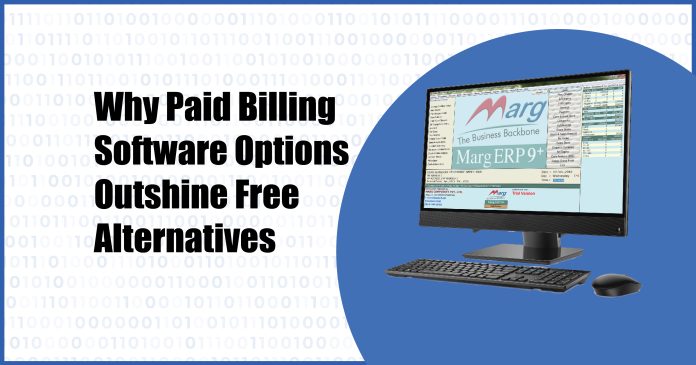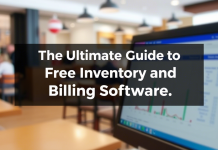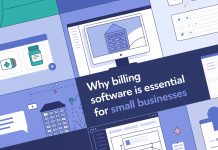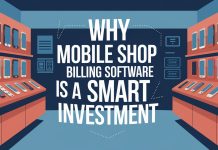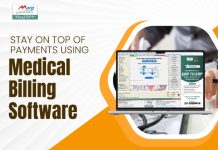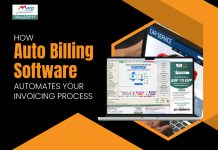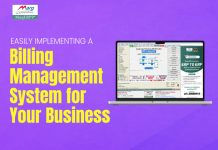In today’s competitive retail environment, having the right tools to manage your business is critical. Billing software plays a vital role in ensuring smooth operations, accurate billing, and enhanced customer experiences. While there are free billing software options available, they often fall short in meeting the needs of growing businesses. Paid solutions offer superior functionality, scalability, and support—exactly what your retail business needs to thrive. Let’s explore why paid billing software stands out and why free options might cost you more in the long run.
What Is Billing Software?
Billing software is a type of digital solution specifically designed to streamline business operations. It automates critical functions like invoicing, tracking payments, managing inventory, and ensuring tax compliance. By digitizing and automating these processes, billing software helps businesses run more efficiently, reduces errors, and improves the overall customer experience.
For retail businesses, the complexity of managing multiple transactions, inventory levels, and customer accounts makes having an efficient billing system even more essential. A reliable billing system allows businesses to maintain accurate financial records, track sales in real-time, and automate tedious manual tasks, ensuring that employees can focus on more value-added activities.
Paid billing software typically offers advanced functionalities that go beyond the basics of invoicing and payment tracking. These tools are specifically designed to meet the evolving needs of growing businesses, with features that ensure smooth operations and scalability as the business expands.
Key Benefits of Paid Billing Software
When you choose a paid billing software solution, you gain access to advanced tools and features that free software options often lack. Let’s break down the key benefits:
Advanced Functionality
Paid software often includes a wider array of tools that can help you manage multiple aspects of your business. Features like multi-location management, automated inventory tracking, real-time reporting, and integration with accounting systems can simplify operations and reduce human errors. These advanced tools ensure that your business runs smoothly even as it grows, something that free billing software typically lacks.
Customization
Not all businesses operate the same way, and one-size-fits-all software rarely meets every need. Paid billing software allows for a higher degree of customization, whether it’s adjusting the layout of invoices, generating customized reports, or integrating the software with other business systems. This flexibility is essential for businesses with specific needs, as it enables the software to be adapted to the way the business operates.
Scalability
As your business grows, so too will your transaction volumes and operational complexity. Paid software is designed to scale alongside your business, enabling you to handle a larger number of transactions, multiple locations, and more complex inventory management without experiencing slowdowns or system crashes. Free billing software, on the other hand, may struggle to keep up with increased business activity, resulting in inefficiencies.
Reliable Support
When issues arise, having access to reliable customer support is invaluable. Paid billing software typically comes with access to dedicated customer service teams that are available to resolve problems, answer questions, and provide troubleshooting assistance. Free software options often come with little to no support, leaving you to figure things out on your own, which can be especially stressful during busy times.
Compliance and Security
Paid billing software ensures compliance with local tax regulations such as GST in India. It also prioritizes data security, ensuring that your business and customer data are protected against potential breaches. Compliance and security are often neglected in free software, putting businesses at risk of legal and financial penalties.
Time-Saving Features
Many paid billing systems come with automated features that save you significant time. For instance, automated inventory management, real-time updates on stock levels, and instant tax calculations help businesses stay on top of operations. These time-saving tools allow your employees to focus on more valuable tasks, like customer service or product development.
The Hidden Costs of Free Billing Software
While the price tag of free billing software might be attractive, it’s important to consider the hidden costs associated with it. These costs often arise when the software fails to meet the growing needs of your business or creates additional challenges. Here are some of the hidden costs of using free billing software:
Limited Features
Free billing software often comes with a very basic set of features, which may be sufficient for a very small business or a business that has minimal transactions. However, as your business grows and your needs become more complex, you may find that free software lacks the functionality to handle more sophisticated operations, such as multi-location management or detailed reporting.
Lack of Support
One of the biggest drawbacks of free billing software is the absence of dedicated support. When something goes wrong—whether it’s an error with invoicing or a problem with data syncing—you may be left to resolve the issue on your own. This can result in prolonged downtime, which can hurt your business operations and customer experience.
Data Security Risks
Many free billing software solutions don’t have robust security measures in place, which increases the risk of data breaches. Sensitive business and customer data are invaluable assets, and any loss or compromise could have devastating consequences. Paid billing software, however, generally provides better encryption and security protocols to keep your data safe.
Inflexibility
Free software is often rigid and doesn’t allow for customization or integration with other business systems. This can be frustrating for businesses that need their software to align with their existing processes or connect with other tools (like CRM or accounting software). Paid solutions, on the other hand, allow for much more flexibility in how you use the software.
No Scalability
As your business grows, free billing software might become incapable of handling the increased volume of transactions, users, and locations. This can result in slowdowns, system crashes, or errors that could lead to inaccurate billing and inventory management. Paid software is designed to grow with your business and handle these increased demands seamlessly.
Hidden Costs
Even though free software doesn’t have an upfront cost, there are often hidden costs associated with it. For instance, if the software doesn’t meet your needs, you may have to purchase additional features, add-ons, or upgrades. Furthermore, if the free software doesn’t perform well, you might have to spend time and money troubleshooting issues or seeking alternative solutions.
Why Paid Billing Software Is the Best Choice for Retail Businesses
Paid billing software is specifically designed to meet the needs of growing businesses. It offers features that free options simply cannot compete with. Here are some reasons why paid billing software is the best choice for retail businesses:
Comprehensive Features
Paid billing software typically includes all the essential tools you need to run your business efficiently, such as inventory management, sales reporting, tax calculations, customer tracking, and more. These features are tailored to the unique needs of retail businesses, ensuring you have everything you need in one platform.
Ease of Use
Despite offering advanced functionality, most paid billing software is designed to be user-friendly. Intuitive interfaces and streamlined workflows make it easy for your team to get up to speed quickly. This reduces the need for extensive training, allowing you to start using the software almost immediately.
Customization and Flexibility
Every business has unique requirements, and paid software offers the flexibility to adapt the system to your specific needs. Whether you need custom invoices, specialized reporting, or integration with other tools, paid software provides the flexibility to meet your demands.
Dedicated Support
One of the key advantages of paid software is the access to reliable, dedicated support teams. If you encounter any issues, the support team is just a call or email away. This ensures that you’re never left in the dark when it comes to resolving software-related issues.
Affordable Pricing
Paid billing software offers transparent pricing with clear costs and no surprises. While the initial investment may seem higher than free software, the long-term benefits of using a paid solution far outweigh the hidden costs associated with free software.
Future-Ready
Paid billing software is designed to scale with your business. As your operations grow and your needs change, paid software can accommodate these changes, ensuring that you’re always equipped to handle the future.
Why Free Software Is Not Really “Free”
Although free billing software may seem like a cost-saving option, the limitations often lead to inefficiencies, errors, and lost revenue. Here’s why free software isn’t really “free” in the long run:
Time Lost
Free software may require manual intervention for tasks that could be automated, resulting in wasted time. The time spent on repetitive tasks could be better used for growing your business or focusing on customer satisfaction.
Errors
Because free software often lacks the features needed to track complex transactions or integrate with other systems, errors are more likely to occur. This can lead to inaccurate billing, missed payments, or incorrect inventory levels, which could affect your bottom line.
Missed Opportunities
Free software typically lacks advanced reporting and analytics capabilities. This means you may miss out on valuable insights that could help you optimize your business operations or spot trends in sales and customer behavior.
In contrast, paid billing software offers automation, advanced reporting, and integration capabilities, ensuring that your business runs smoothly and efficiently.
Conclusion
Investing in the right billing software is crucial for the success of your retail business. While free options might seem attractive initially, their limitations can hold your business back. Paid billing software offers advanced features, scalability, and reliable support, making it the perfect choice for retailers who want to stay ahead of the competition.
Don’t settle for less when it comes to your business. Choose a comprehensive, feature-rich billing solution that’s tailored to your needs and experience the difference today!
Read More:-
- How Human Resource Payroll Software Can Streamline Your Business
- Mastering Community Pharmacy Operations: Inventory & Billing Strategies
- Mastering Balance Sheets, Accounting Standards, and Profit & Loss Insights
- Why Your Mobile Shop Needs a Standardized Bill Format
- Why Is Distributor and Consumer Management Important for Your Business?

